All Trigonometry Resources
Example Questions
Example Question #3 : Solving Word Problems With Trigonometry
A ladder that is feet long is resting against the side of a house at an angle of degrees. In feet, how far up the side of the house does the ladder reach?
You can draw the following right triangle from the information given in the question:

In order to find out how far up the ladder goes, you will need to use sine.
Example Question #1 : Solving Word Problems With Trigonometry
In right triangle ABC, where angle A measures 90 degrees, side AB measures 15 and side AC measures 36, what is the length of side BC?
This triangle cannot exist.
This triangle can exist. Since is a right angle, we can use the Pythagorean Theorem, where is the hypoteneuse:
Example Question #5 : Solving Word Problems With Trigonometry
A support wire is anchored 10 meters up from the base of a flagpole, and the wire makes a 25o angle with the ground. How long is the wire, w? Round your answer to two decimal places.
28.31 meters
23.81 meters
21.83 meters
25 meters
23.81 meters
To make sense of the problem, start by drawing a diagram. Label the angle of elevation as 25o, the height between the ground and where the wire hits the flagpole as 10 meters, and our unknown, the length of the wire, as w.
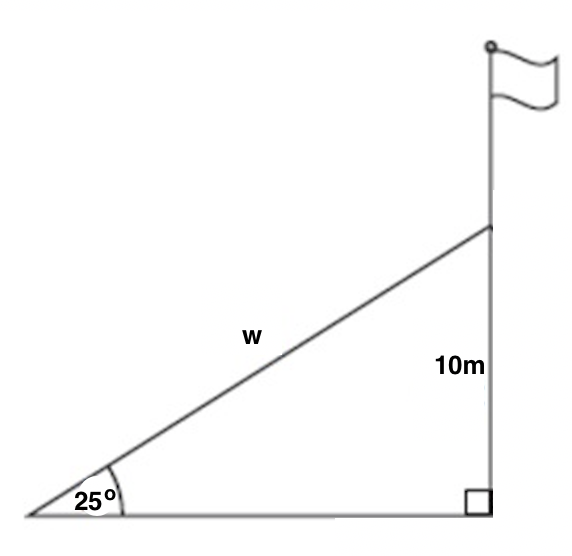
Now, we just need to solve for w using the information given in the diagram. We need to ask ourselves which parts of a triangle 10 and w are relative to our known angle of 25o. 10 is opposite this angle, and w is the hypotenuse. Now, ask yourself which trig function(s) relate opposite and hypotenuse. There are two correct options: sine and cosecant. Using sine is probably the most common, but both options are detailed below.
We know that sine of a given angle is equal to the opposite divided by the hypotenuse, and cosecant of an angle is equal to the hypotenuse divided by the opposite (just the reciprocal of the sine function). Therefore:
(Use a calculator in degree mode to find that after rounding to two decimal places)
meters
To solve this problem instead using the cosecant function, we would get:
(Use a calculator in degree mode to find that after rounding to two decimal places)
meters
The reason that we got 23.7 here and 23.81 above is due to differences in rounding in the middle of the problem.
Please note that the answer choice is correct based on the Pythagorean Theorem, but does not use all of the provided info to find an exact solution rounded to two decimal places.
Example Question #6 : Solving Word Problems With Trigonometry
When the sun is 22o above the horizon, how long is the shadow cast by a building that is 60 meters high?
82 meters
150 meters
24 meters
65 meters
162 meters
150 meters
To solve this problem, first set up a diagram that shows all of the info given in the problem.
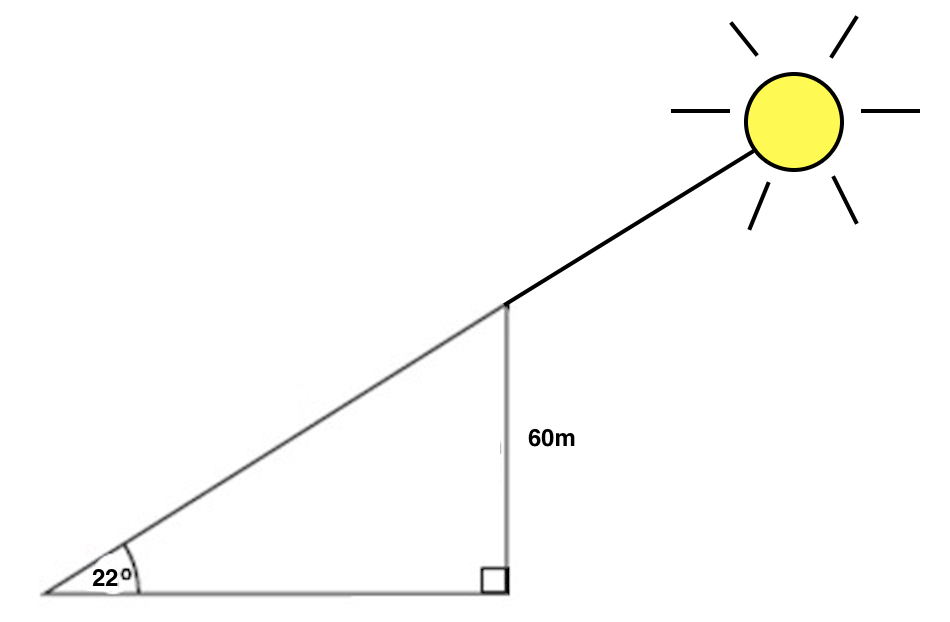
Next, we need to interpret which side length corresponds to the shadow of the building, which is what the problem is asking us to find. Is it the hypotenuse, or the base of the triangle? Think about when you look at a shadow. When you see a shadow, you are seeing it on something else, like the ground, the sidewalk, or another object. We see the shadow on the ground, which corresponds to the base of our triangle, so that is what we'll be solving for. We'll call this base b.
Next, think about which trig functions relate our known angle, 22o, to the base (or adjacent) and the opposite sides of the triangle. If you thought tangent (or cotangent), you are correct! We know that and . For simplicity's sake, we'll use tangent to solve this problem. We have:
(Use a calculator and round to two places to find that )
meters
Therefore the shadow cast by the building is 150 meters long.
If you got one of the incorrect answers, you may have used sine or cosine instead of tangent, or you may have used the tangent function but inverted the fraction (adjacent over opposite instead of opposite over adjacent.)
Example Question #7 : Solving Word Problems With Trigonometry
From the top of a lighthouse that sits 105 meters above the sea, the angle of depression of a boat is 19o. How far from the boat is the top of the lighthouse?
110.53 meters
423.18 meters
318.18 meters
36.15 meters
318.18 meters
To solve this problem, we need to create a diagram, but in order to create that diagram, we need to understand the vocabulary that is being used in this question. The following diagram clarifies the difference between an angle of depression (an angle that looks downward; relevant to our problem) and the angle of elevation (an angle that looks upward; relevant to other problems, but not this specific one.) Imagine that the top of the blue altitude line is the top of the lighthouse, the green line labelled GroundHorizon is sea level, and point B is where the boat is.
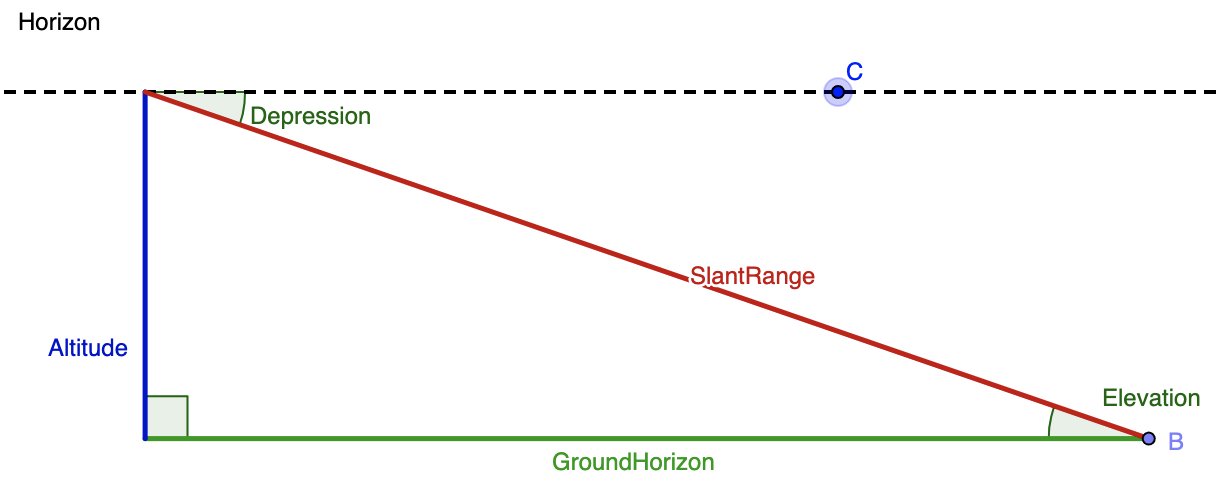
Merging together the given info and this diagram, we know that the angle of depression is 19o and and the altitude (blue line) is 105 meters. While the blue line is drawn on the left hand side in the diagram, we can assume is it is the same as the right hand side. Next, we need to think of the trig function that relates the given angle, the given side, and the side we want to solve for. The altitude or blue line is opposite the known angle, and we want to find the distance between the boat (point B) and the top of the lighthouse. That means that we want to determine the length of the hypotenuse, or red line labelled SlantRange. The sine function relates opposite and hypotenuse, so we'll use that here. We get:
(where d is the distance between the top of the lighthouse and the boat)
(using a calculator in degree mode and rounding to two digits, we get that )
meters
Example Question #8 : Solving Word Problems With Trigonometry
Angelina just got a new car, and she wants to ride it to the top of a mountain and visit a lookout point. If she drives 4000 meters along a road that is inclined 22o to the horizontal, how high above her starting point is she when she arrives at the lookout?
1616.1 meters
3708.74 meters
1480 meters
10677.87 meters
9.37 meters
1480 meters
As with other trig problems, begin with a sketch of a diagram of the given and sought after information.
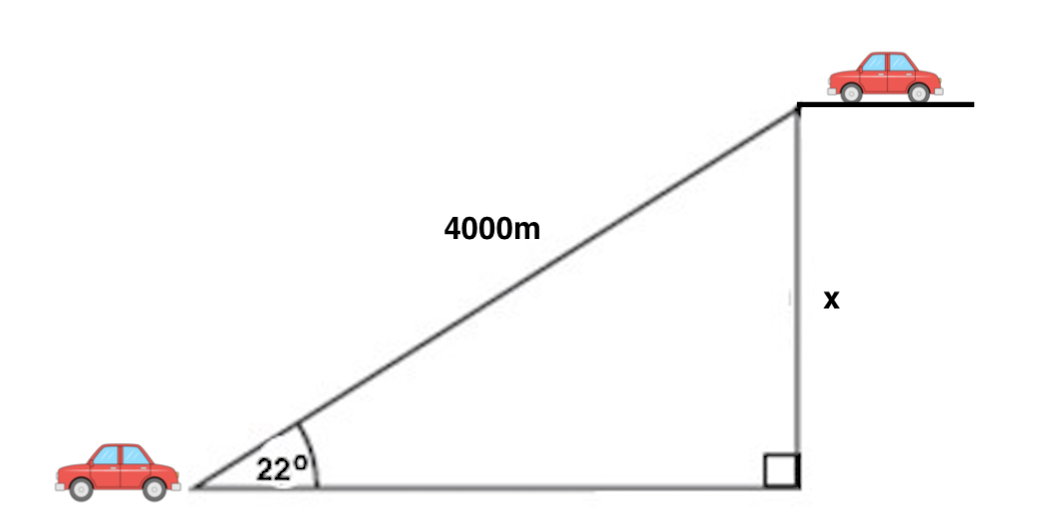
Angelina and her car start at the bottom left of the diagram. The road she is driving on is the hypotenuse of our triangle, and the angle of the road relative to flat ground is 22o. Because we want to find the change in height (also called elevation), we want to determine the difference between her ending and starting heights, which is labelled x in the diagram. Next, consider which trig function relates together an angle and the sides opposite and hypotenuse relative to it; the correct one is sine. Then, set up:
(using a calculator in degree mode and rounding to two decimals we get that )
Therefore the change in height between Angelina's starting and ending points is 1480 meters.
Example Question #9 : Solving Word Problems With Trigonometry
Two buildings with flat roofs are 50 feet apart. The shorter building is 40 feet tall. From the roof of the shorter building, the angle of elevation to the edge of the taller building is 48o. How high is the taller building?
73.5 feet
77.2 feet
95.5 feet
40 feet
55.5 feet
95.5 feet
To solve this problem, let's start by drawing a diagram of the two buildings, the distance in between them, and the angle between the tops of the two buildings. Then, label in the given lengths and angle.
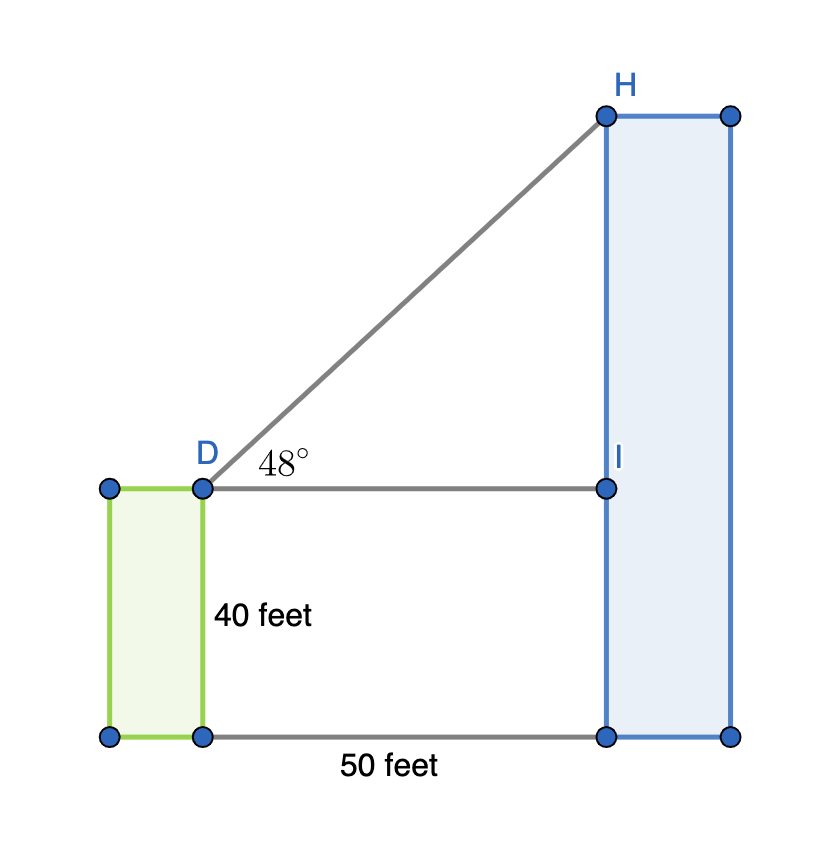
We are being asked to find the height of the taller building, but this diagram does not provide a triangle that has as one of its sides the entire height of the larger (rightmost and blue) building. However, we can instead find the distance , and then add that to the 40 foot height of the shorter building to find the entire height of the taller building. Start by finding :
Remember that this is not the full height of the larger building. To find that, we need to add feet. Therefore, the taller building is 95.5 feet tall.
Example Question #10 : Solving Word Problems With Trigonometry
Two buildings with flat roofs are 80 feet apart. The shorter building is 55 feet tall. From the roof of the shorter building, the angle of elevation to the edge of the taller building is 32o. How high is the taller building?
104.6 feet
129.6 feet
122.8 feet
97.4 feet
49.6 feet
104.6 feet
To solve this problem, let's start by drawing a diagram of the two buildings, the distance in between them, and the angle between the tops of the two buildings. Then, label in the given lengths and angle.
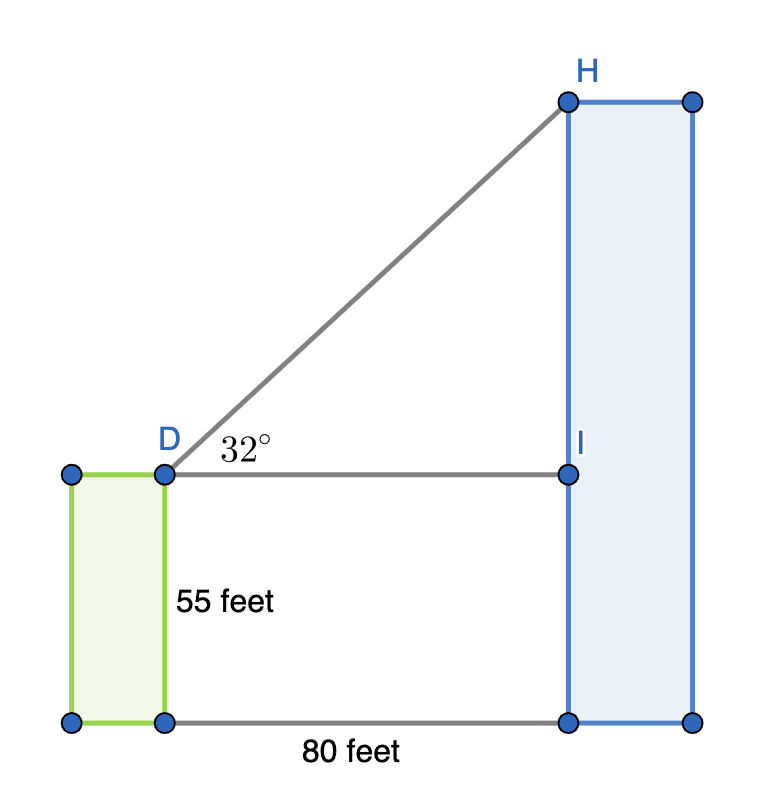
We are being asked to find the height of the taller building, but this diagram does not provide a triangle that has as one of its sides the entire height of the larger (rightmost and blue) building. However, we can instead find the distance , and then add that to the 40 foot height of the shorter building to find the entire height of the taller building. Start by finding :
Remember that this is not the full height of the larger building. To find that, we need to add feet. Therefore, the taller building is 104.6 feet tall.
Example Question #31 : Right Triangles
Two buildings with flat roofs are 330 feet apart. The shorter building is 31.4 feet tall. From the roof of the shorter building, the angle of elevation to the edge of the taller building is 61.4o. How high is the taller building?
933.9 feet
189.4 feet
603.9 feet
321.13 feet
635.3 feet
635.3 feet
To solve this problem, let's start by drawing a diagram of the two buildings, the distance in between them, and the angle between the tops of the two buildings. Then, label in the given lengths and angle.

We are being asked to find the height of the taller building, but this diagram does not provide a triangle that has as one of its sides the entire height of the larger (rightmost and blue) building. However, we can instead find the distance , and then add that to the 40 foot height of the shorter building to find the entire height of the taller building. Start by finding :
Remember that this is not the full height of the larger building. To find that, we need to add feet. Therefore, the taller building is 635.3 feet tall.
Example Question #692 : Trigonometry
You need to build a diagonal support for the bleachers at the local sportsfield. The support needs to reach from the ground to the top of the bleacher. How the support should look is highlighted in blue below. The bleacher wall is 10 feet high and perpendicular to the ground. The owner would like the support to only stick out 3 feet from the bleacher at the bottom. What is the length of the support you need to build?

20 ft
11.32 ft
109 ft
10.44 ft
10.44 ft
It is important to recognize that the bleacher, the ground, and the support form a right triangle with the right angle formed by the intersection of the bleacher wall and the ground. We know the bottom of the support should only be 3ft from the bleacher wall on the ground and the bleacher wall is 10ft high. We will use the Pythagorean Theorem to solve for the length of the support, which is the hypotenuse of this right triangle. Our base of the triangle is 3 feet and the leg is 10 feet.
And so we need a support of 10.44 feet long.
All Trigonometry Resources














































































